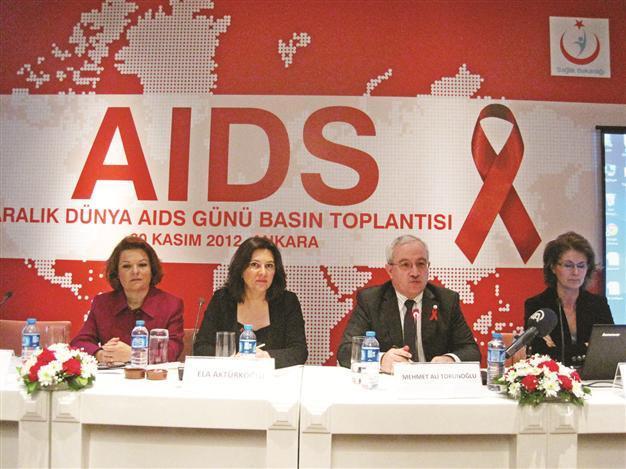Turkey considered a high risk area for HIV spread
ANKARA - Anatolia News Agency

UN Turkey Representative Ela Aktürkoğlu (C) says the number of people carrying the HIV virus has reached 34 million, 30.7 million of which are adults. AA photo
Before World AIDS Day a U.N. official has warned Turkey is at risk due to its proximity to Eastern Europe and Central Asia, where HIV infection rates have shown a radical rise recently.
Speaking at a meeting organized by the Turkish Health Ministry on Nov. 30, U.N. Turkey Representative Ela Aktürkoğlu said the number of infected people had increased by 21 percent in these two regions between 2005 and 2011.
Aktürkoğlu said the global number of people carrying the HIV virus had reached 34 million, 30.7 million of which were known to be adults. The death toll due to diseases triggered by the HIV virus totaled 1.7 million last year, according to information Aktürkoğlu provided.
Public Health Institution of Turkey deputy chief Mehmet Ali Torunoğlu said they had short, long and middle-term solution roadmaps to prevent the disease and that they would soon enlarge the network of volunteer consultancy centers as well as test centers. Torunoğlu said the highest risk groups were addicts of drugs consumed by intravascular injection, homosexuals, sex workers, convicts and inmates and refugees, because it was hard to reach these groups.
Dec. 1 is marked internationally as World AIDS Day to raise awareness of the disease, prevent further infections and remember the millions of people around the world who have died from it.
Meanwhile, Athens is seeing an alarming increase in new HIV infections, particularly among intravenous drug users, health officials warned on Nov. 30, as Greece struggles through a protracted financial crisis in which funding for health care and drug treatment programs has been slashed. While there were about 10-14 new HIV infections per year among Athens drug users from 2008 to 2010, that number shot up to 206 new cases last year and 487 new cases by October this year , officials said.
“There is no doubt we have a big and rapidly developing epidemic in Athens,” said Angelos Hatzakis, an epidemiology and preventive medicine professor at Athens University.
